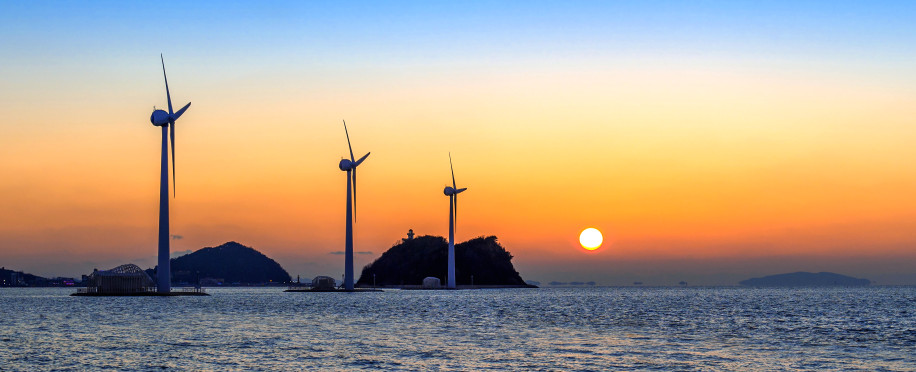Copyright © 2025 lmitac.com All Rights Reserved. Contact - Terms and Conditions - Privacy Policy - Quality Policy - Become an instructor - Vacancies - Sitemap
London Maritime Academy is a trade name for London Premier Groupversion: 2.9.0
London Maritime Academy is a trade name for London Premier Group

Posted on : 3/20/2024, 10:24:30 PM
Last Update : 3/20/2024, 10:24:30 PM
Picture a wave, slowly diving in and out of the shore, moving sand around in an endless cycle of push and pull. It sure sounds calm right? That's not what innovators see, however! They see in that movement a chance to create renewable energy.
That's how offshore energy works, instead of burning oil or gas to create energy, marine engineers developed new and innovative ways to create sustainable energy.
How did they do that? And does it work? Is it good? All these questions and more we'll be answering in this article today.
As opposed to inland energy, offshore renewable energy derives electric power from sources in motion as an offshore site can give tides, waves, and winds in the oceans and seas. Maximising the effectiveness of these clean resources allows for pollution-saving and resourceful energy systems that transition away from international fossil fuel-based energy production to potentially more green and responsible solutions.
Besides the conventional offshore energy resources, which can also be utilized for power generation activities, there are other non-conventional energy sources that could be considered for electricity provision. This includes:
Wind Energy: Offshore wind farms are basically wind turbines installed in the open free water where the waves are strong and uninterrupted. By using the kinetic energy of the wind, the turbines turn it into electrical power that is then transmitted back to the mainland.
Wave Energy: Wave energy is a technology that captures the motion of ocean waves and converts it into electricity. This is possible with water-powered devices, for instance, such as floating buoys, oscillating water columns, or submerged turbines. Waves are an unceasing and foreseeable energy source therefore they make a perfect candidate for offshore energy production.
Tidal Energy: Tidal energy, just like traditional hydropower, uses the cyclic motion of the ocean tide to generate electricity. These can be created using tidal barrages, which are large structures built over estuaries or bays or by tidal turbines placed beneath the sea surface. Tidal energy is precisely predictable and can result in a dependable and constant source of power supply.
The development of offshore energy technologies has significantly transformed the maritime industry, providing the global demand for energy with minor environmental risk. This can easily be named the major advantage of these systems, but are there any? let's find out:
Clean and Renewable: Offshore energy sources are renewable and produce no emissions of greenhouse gases or pollutants. In contrast to fossil fuels, they don’t aggravate the problem of climate change and air pollution, therefore, they are safer and more suitable for companies to invest in the future.
Abundant Resources: Offshore areas generally possess higher wind speeds, more powerful waves, and more frequent tidal patterns when compared to onshore areas. This translates to higher capacities of power generation that might be able to answer the growing need for more electrical energy internationally.
Less Visual Impact: The offshore energy facilities are usually located at bigger distances from the shore in deeper waters, thus they are less visible to human eyes while on-land energy sites may cause some aesthetic disturbances. This will, therefore, make it less likely for it to hinder the success of seafaring

Onshore is more affordable and safe, it's easier to set and maintain a platform near the gulf as opposed to platforms poised deep inside the ocean.
On the other hand, the force of waves and the subsea currents offer more capacity to generate energy. That is to say, Offshore energy is high-risk and high-reward, while onshore energy might be easier in technical terms, but it's also less productive.
Here we can only say that both of these energy sources have unique qualities and they're great for any company advancing in this field, not to mention these energy production services are relevant to almost every career sector and can be a great chance for a company to create more jobs as well as clean energy.
News of these clean products of energy is attracting professionals from every specialty to study and develop a keen knowledge of these projects and how they can leverage them in their respective departments. That’s why courses have been launched online that focus on these energies and how they can be featured in every field of work.
If you find yourself interested in implementing the offshore energy strategy in your project, start by learning how you can farm and tailor this energy through courses offered by an esteemed maritime training academy.
As we meet the end line of this article, we can say the future of offshore energy production seems to be very bright. Technology growth in this area, for instance, the advanced wind turbines and wave energy devices, make the offshore systems more efficient and reliable than before.